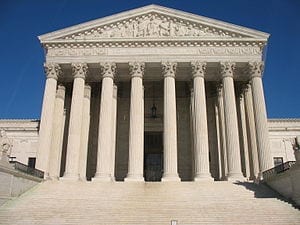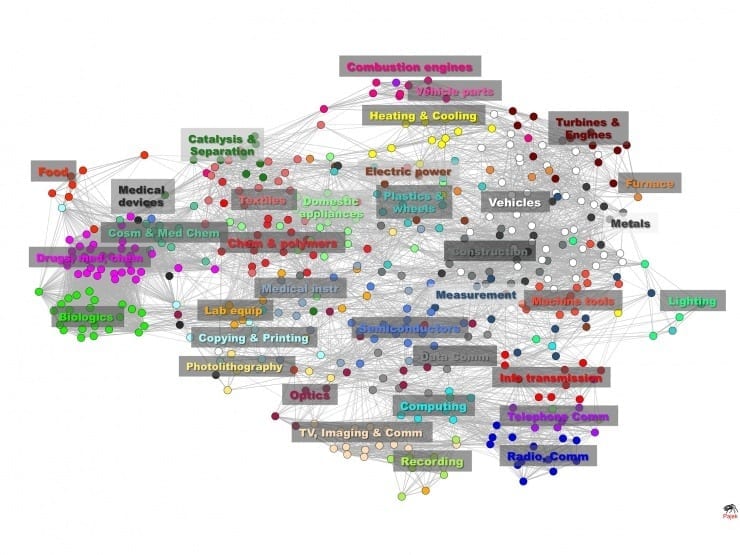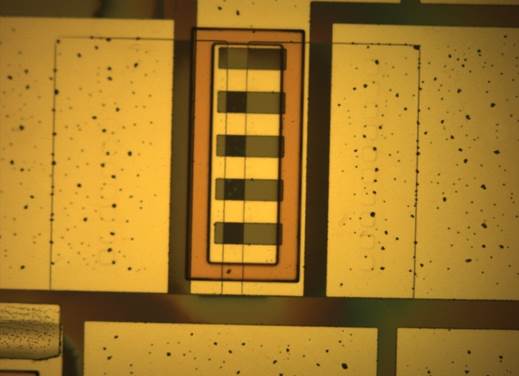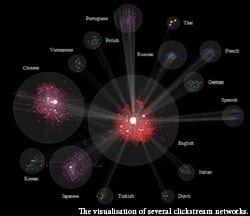
The Supreme Court today unanimously struck down patents on BRCA1 and BRCA2
When Angelina Jolie announced last month that she decided to get a prophylactic double mastectomy, she based her decision on the presence of the BRCA1 gene in her body—a gene that was detected via a costly medical test.
The Supreme Court today unanimously struck down patents on BRCA1 and BRCA2—two genes linked to hereditary forms of breast and ovarian cancer—when the genes occur in the body. Myriad did not create or alter any of the genetic information of the BCRA1 and BRCA2 genes, and thus does not satisfy patenting requirements, according to the decision. “Myriad discovered the precise location and sequence of what are now known as the BRCA1 and BRCA2 genes,” Justice Clarence Thomas wrote for the court.
This ruling could lead to cheaper tests for individuals who may be at increased risk of developing cancer. If Myriad Genetics were allowed to hold exclusive patents on these genes, the company would have maintained sole rights to create medical tests that indicate whether an individual has mutations that would lead to elevated risk of developing these cancers.
The ruling should also affect the medical research community. Because the genes were patented, any researcher who found a new way to isolate the genes would not have been able to use it, since Myriad held patents on the genes themselves. The court’s decision removes that restriction.
On average, women have a 12 to 13 percent risk of developing breast cancer over their lifetimes, but that risk spikes with the presence of mutations in the BRCA1 andBRCA2 genes—jumping to between 50 and 80 percent for breast cancer and 20 and 50 percent for ovarian cancer, the decision notes.
Myriad had identified the exact location of the BRCA1 and BRCA2 genes; it had not discovered that heredity plays a role in establishing risk of breast and ovarian cancer. “Myriad did not create anything,” Thomas wrote. “To be sure, it found an important and useful gene, but separating that gene from its surrounding genetic material is not an act of invention.” “I’m just incredibly relieved,” says Lisbeth Ceriani, a breast cancer survivor and original plaintiff who struggled to afford Myriad’s test.
The Latest Bing News on:
Gene patents
- Patient dies in Pfizer study of Duchenne gene therapyon May 7, 2024 at 2:39 pm
Pfizer said the patient, a young boy who was treated earlier last year, had died suddenly. The company is working with trial researchers to investigate further.
- German Federal Patent Court Invalidates Patent Asserted By 10x Genomics, Delivering Legal Win to NanoString and Brukeron May 7, 2024 at 11:05 am
Bruker Corporation (Nasdaq: BRKR) today announced that the German Federal Patent Court has ruled in favor of NanoString Technologies Germany GmbH by invalidating European Patent No. 2794928B1 (the ...
- Exclusive: Feng Zhang CRISPR startup gathers patents, locking up rights to family of editing techon May 7, 2024 at 4:00 am
In the bid to lock up patent rights to a growing suite of gene-editing technologies, Arbor Biotechnologies has acquired a small startup founded by MIT scientist and CRISPR pioneer Feng Zhang, the ...
- Court Grants Vizgen Motion to Expand Antitrust Case vs.10x, Harvardon May 6, 2024 at 4:59 pm
Vizgen cited as examples of anticompetitive activities what it called the unlawful bundling of 10x Genomics’ existing Chromium Single Cell Immune Profiling platform, and its Visium Spatial Gene ...
- Research team develops fast-track process for genetic improvement of plant traitson May 6, 2024 at 12:10 pm
Researchers interested in improving a given trait in plants can now identify the genes that regulate the trait's expression without doing any experiments.
- Livestock genome patent case rears head again with fresh court actionon April 30, 2024 at 11:05 pm
A long-running and controversial livestock genetics patent case has returned with five Australian industry groups including Meat & Livestock Australia now defending a new legal challenge in the ...
- Alnylam Pharmaceuticals gets grant for inhibiting expression of serum amyloid a geneon April 30, 2024 at 5:45 am
Discover the groundbreaking patent by Alnylam Pharmaceuticals Inc for a dsRNA molecule targeting Serum Amyloid A gene expression. Learn about the innovative design and potential applications in ...
- Cell and gene therapy companies trip at scalability hurdleon April 29, 2024 at 3:09 am
Experts hold scalability challenges and high costs accountable for market failures within the cell and gene therapy landscape.
- NxGen founder fires back at Penn and Dr. James Wilson in lawsuit over 'decade-long nightmare'on April 25, 2024 at 11:42 am
The one-time postdoctoral researcher alleges her "life’s work is being held hostage" by Penn and Dr. James Wilson, director of the university's gene therapy program.
- Meeting the cell and gene therapy scale-up challengeon April 25, 2024 at 9:00 am
One of the pivotal challenges in the development and commercialisation of cell and gene therapies (CGT) lies in scaling up production. This challenge is particularly pronounced as companies transition ...
The Latest Google Headlines on:
Gene patents
[google_news title=”” keyword=”gene patents” num_posts=”10″ blurb_length=”0″ show_thumb=”left”]
The Latest Bing News on:
Patent trolls
- 5 Steps to Patent an Ideaon May 6, 2024 at 4:59 pm
Think you've got a million-dollar idea? You're not alone. There's always a few people out there at any moment, convinced they've got the next big app or the next popular product, while ...
- New Data Show There Is a Problem with the U.S. Patent System—But It’s Not Patent Trollson May 6, 2024 at 4:15 am
If the headlines are to be believed, every aspect of American life, from farming to football, is under threat due to excessive patent litigation. While these anecdotes may seem compelling, it is ...
- Moderna Investors Should Beware Patent-Dispute Fallouton April 23, 2024 at 11:40 am
Moderna's stock soared on positive cancer vaccine trial results, but legal troubles loom as a patent dispute threatens massive damages. Read my analysis here.
- Senator introduces legislation targeting patent trollson April 23, 2024 at 3:43 am
PCWorld helps you navigate the PC ecosystem to find the products you want and the advice you need to get the job done.
- Report: Obama to announce measures against patent trollson April 23, 2024 at 3:33 am
After months on the market, Windows 8 tablets have yet to rack up the sales Microsoft and PC vendors were originally hoping for. But on Monday Taiwanese PC maker Acer showed off what could be the ...
- How two small Texas towns became the patent-law centre of Americaon April 15, 2024 at 5:00 pm
Around the same period, “it also happened that there was an explosion of patent-troll litigation,” says Paul Gugliuzza of Temple University, referring to plaintiffs who own bad patents and ...
- Empirical Evidence on the Behavior and Impact of Patent Trolls: A Surveyon April 7, 2024 at 5:00 pm
Cohen, Lauren, Umit Gurun, and Scott Duke Kominers. "Empirical Evidence on the Behavior and Impact of Patent Trolls: A Survey." In Patent Assertion Entities and Competition Policy, edited by D. Daniel ...
- Meta Transfers AI-Related Patents to Midjourney to Thwart Patent Trollson April 3, 2024 at 3:10 pm
But the specter of the patent troll threatens to keep companies bogged down in distracting and costly legal battles. “An open approach to AI leads to better, safer products, faster innovation ...
- Intel files lawsuit to overturn European patent that threatens to block its exports to Germanyon March 28, 2024 at 10:12 am
Speaking to MarketWatch, an Intel spokesperson called R2 a “patent troll” and said that “as with its invalidated U.S. patent, we strongly believe R2’s patent at issue in the German case is ...
- patent trollon March 12, 2024 at 12:07 am
Hypertext is one of South Africa’s leading technology news and reviews sites. We publish original content daily for consumers and businesses. All original words & media by Hypertext by htxt ...
The Latest Google Headlines on:
Patent trolls
[google_news title=”” keyword=”fix the internet” num_posts=”10″ blurb_length=”0″ show_thumb=”left”]











